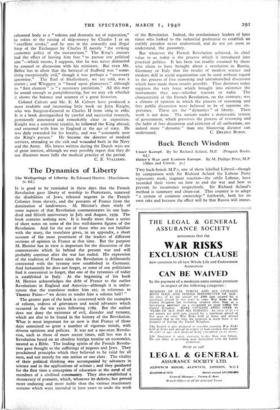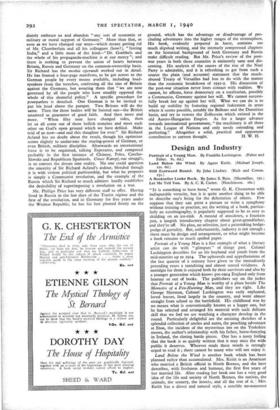Back Bench Wisdom
Hitler's War and Eastern Europe. By M. Phillips Price, M.P. (Allen and Unwin. is.)
Two back-bench M.P.s, one of them labelled Liberal—though by comparison with Sir Richard Acland the Labour Party represents stark, stagnant reaction—the other Labour, have recorded their views on how to end the war and how to prevent its recurrence respectively. Sir Richard Acland's method is summary and clean-cut. This country is to adopt " a system of common ownership " forthwith, both for its own sake and because the effect will be that Russia will imme-
diately embrace us and abandon " any sort of economic or military or moral support of Germany." More than that, as soon as we have changed our ways—which means getting rid of Mr. Chamberlain and all his colleagues (how?), " freeing India," and a little more of the kind—" Dr. Goebbels and the whole of his propaganda-machine is at our mercy "; and there is nothing to prevent the union of hearts between Britain, Russia and Germany on the common-ownership basis. Sir Richard has the modus operandi worked out in detail. He has framed a four-page manifesto, to be got across to the German people by every means available, including loud- speakers from the trenches, confessing all the sins of Britain against the Germans, but assuring them that " we are now governed by all the people who have steadily opposed the whole of this shameful policy." A specific procedure for pourparlers is sketched. One German is to be invited to put his head above the parapet. Two Britons will do the same. Then the three bodies will be hoisted out—the British unarmed as guarantee of good faith. And then more and more. " When fifty men have changed sides, then let us all come out of these hellish trenches and meet each other on God's open ground which we have defiled. Make trial of us now—and end this slaughter for ever." Sir Richard Acland has no doubt about the result, though his optimism seems slightly to under-rate the staying-power of German, or even British, military discipline. Afterwards an international force is to be organised, talking Esperanto, and composed probably in the first instance of Chinese, Poles, Czecho- Slovaks and Republican Spaniards. Unser Kampf, our struggle, is to convert the dream into reality. No one could question the sincerity of Sir Richard Acland's ardour, blended though it is with violent political partisanship, but what he proposes is simply a Communist revolution, and the example of the Russia which Sir Richard so much admires hardly establishes the desirability of superimposing a revolution on a war.
Mr. Phillips Price has very different stuff to offer. Having lived in Russia in the last days of the Tsarist regime and the first of the revolution, and in Germany for five years under the Weimar Republic, he has his feet planted firmly on the ground, which has the advantage or disadvantage of pre- cluding adventures into the higher ranges of the stratosphere. His book, evidently prepared in haste, contains too much slipshod writing, and the intensely compressed chapters on the historical background of both Germany and Russia make difficult reading. But Mr. Price's review of the post- war years in both those countries is eminently sane and dis- cerning. His analysis of the causes of the rise of the Nazi Party is admirable, and it is refreshing to get from such a source the plain (and accurate) statement that the much- abused Treaty of Versailles had less to do with the matter than the economic breakdown of 1931-2. His discussion of the post-war situation never loses contact with realities. We cannot, he affirms, force democracy on a totalitarian, possibly a Communist, Germany against her will. We cannot success- fully break her up against her will. What we can do is to build up stability by fostering regional federation in areas where it seems possible, notably the Balkans and the Danubian basin, and try to restore the Zollverein which existed in the old Austro-Hungarian Empire. As for a larger advance towards international government, " the machinery is all there in the League of Nations and only needs extending and perfecting." Altogether a solid, practical and opportune contribution to current thought. H. W. H.















































 Previous page
Previous page